Waking Up During The Night… Is There Something You Can Do?
Many people have problems with waking up in the middle of the night and then being unable to get back to sleep. This can lead to a difficult day ahead, as well as increasing your fatigue. Find out how you can deal with this problem and improve the quality of your sleep.
What happens when you go to sleep?
Arestless night, with frequent awakenings can leave you felling fragile and exhausted the next morning. Your body and mind will feel stressed because you have not had enough regeneration time. You may have problems with memory and reasoning as well. So getting good quality sleep is essential, especially if you are recovering from fatigue.
When you go to sleep, your brain doesn’t completely switch off. It still stays alert to wake you up in case of danger. It also changes its function and goes through a number of sleep stages and cycles.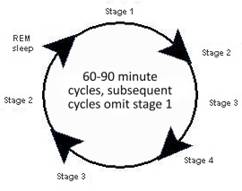
Brain waves states (ranging from alpha, beta and theta) modulate and dreams occur in the deeper levels of sleep (REM). We go through a number of sleep cycles a night (often between 4 and 7) and each cycle can last between 60 and 90 minutes. The cycles are quite precise and have to be followed exactly. The REM sleep marks the end of each cycle and it gets longer with each cycle. We need a certain amount of REM sleep per night. [For more detail on this please seeSleep Stages and Cycles.]
If you wake in the middle of this process, it will disturb the natural cycle, and because of that you will feel groggy and tired.
Why do you wake up at night?
There are a number of reasons why you may have developed a pattern of waking up in the night. They include:
Being disturbed by light
During the evening, our bodies produce melatonin, which causes us to feel sleepy. It is triggered by darkness. Many of our cities are now bathed in light all around the clock. We also have many lights in our homes. We can be woken up by flashing lights, lights from passing cars, LEDs from electrical appliances in our bedrooms and other stray light intrusions. A smart move is to get heavy, light-excluding drapes or blinds or, failing that, wear an eye mask. It’s a good idea to remove electrical appliances e.g. radio, television, computer from your bedroom.
Being disturbed by sound
Sound is another great disturber of sleep. We all get used to certain sounds, such as the surf breaking on the sand, or traffic humming along a distant highway. Sudden noises, such as a door crashing, or someone entering the room loudly, or a partner breaking into loud snoring, are apt to startle you into waking.
It’s a good idea to talk to your family members and explain to them that you need your sleep. You might also sound proof your bedroom as much as possible and wear earplugs if necessary. You may also need to think about the possibility of getting a ‘white noise’ machine. Some of them generate a noise that’s similar to listening a radio between two stations, others imitate sounds of rain, ocean waves or rainforest; a repetitive noise which masks other sounds, and which you grow used to. Air conditioners and fans also often create ‘white noise’ as a by-product of their cooling function.
Wanting to go to the toilet
Sometimes you wake up for other reasons, and you realize that you might as well go to the bathroom. This can become a habit, and soon you are always waking up in the night to empty your bladder. The way round it is to re-train your bladder by not responding to its call. Try to give it five minutes before you go to the bathroom. Maybe you won’t need to go until the morning. Cutting back on liquids in the evening helps as well.
Being depressed
Depressed people often wake up in the small hours of the night and then toss and turn until dawn. If you have been depressed for more than a couple of weeks, then it would be worth getting help for it. This could be counseling or a short-term anti-depressant medication. At the same time, do everything you can to alleviate your stress by activities such as relaxation, meditation and exercise. [For more details about depression, please seeThe Relationship between depression and tiredness].
Alcohol
Drinking alcohol in the evening may help you fall asleep, but it will hurt the quality of your sleep. Even if you’re not actually waking up in the night, your sleep cycles will be disturbed.
Being Uncomfortable in bed
If your mattress is old, hard or lumpy, then it is likely that you won’t have a good night’s sleep on it. Research shows that people sleep better on new mattresses. Be prepared to change your mattress every ten years. Another cause of night discomfort is being too hot or too cold. Make sure that your bedroom is comfortably cool, but not cold. It is always good to have a supply of fresh air but if this isn’t possible for any reason, then use an ionizing machine to produce high quality ventilation.
Hypoglycemia
If you wake up at the same time in the night every night, then this may well indicated that you are suffering from hypoglemia (low blood sugar). [Please seeGlycemic index, blood sugar fluctuations and tirednessfor more details on this condition.] Low blood sugar results in the production of adrenaline and cortisone which tends to wake you up. Try a small low GI carbohydrate snack before bedtime and see if this helps.
Allergies
Certain allergies are known to disrupt sleep. One, that should be mentioned here, is the allergy (or intolerance) to cow’s milk. Because this allergy is so common, it wouldn’t hurt to check if it’s affecting you as well. Stop drinking milk for a couple of days and see if this has any effect on the quality of your sleep.
Medications
Different types of medication can cause sleep problems. These include asthma medication, sleeping pills, hormones, antihypertensives, and many others. If you are taking any pills on regular basis, you should discuss them with your doctor to see if they might be contributing to your sleep difficulties.
Nutritional deficiencies
The most common nutritional deficiency that could prevent you from getting a good night’s rest ismagnesium deficiency. In one study 200 patients suffering from insomnia started taking magnesium supplements and 99 of them reported improvement. That’s almost half of them. So having more magnesium in your diet might help you sleep better.
Magnesium is found in tomatoes, spinach, soybeans, almonds, cashews, Brazil nuts, beans, buckwheat flour, barley, artichokes…
Beinglow in ironwill also hurt your sleep. If you think that could be the cause, make sure you see your doctor before starting taking any supplements. You have to be checked first to see if you actually are low in iron as an iron overload, on the other hand, may also cause poor sleep and tiredness.
Tryptophanis an essential amino acid, needed in you body’s production of serotonin, a brain chemical that helps us sleep. If you don’t get enough tryptophan in your diet, your body will not be able to produce it in any other way. So make sure your diet includes enough milk (if you are not lactose intolerant!) turkey, tuna, poultry meat, fish, beef, eggs, nuts, brown rice, cheese… All of these are rich in tryptophan.
In order for our body to convert tryptophan into serotonin, you will also needvitamin B6. You can find it in salmon, bananas, fortified cereal, turkey, chicken, spinach, hazelnuts…
Various sleep disorders
For more information on sleep disorders such as sleep apnea, restless leg syndrome and narcolepsy please seeSleep disorders that can make you tired.
Other causes of poor sleep are…
Other most common reasons why your sleep isn’t as effective as it might be are
- Stress– if you are living under constant stress, your sleep will be affected
- Bedroom temperature- Sleep experts say that the temperature should be between 60° and 65°F (15°-18°C). For babies, it is better to keep the temperature at 65°F.
- Exercising late in the evening– this would overexcite your body and you won’t be able to fall asleep
- Not exercising at all– it has been proven that inadequate exercise contributes to poor sleep
Things you can do to sleep better
In order to sleep well, it is worth creating some good sleeping habits. Plan to:
- Try to go to bed and get up at the same time every day as this will set your body into a positive pattern of expectation
- Don’t take caffeine (coffee, tea, colas etc) after 4 pm as this can increase wakefulness
- Don’t have a heavy meal before bed, but try to have a light snack instead
- Avoid alcohol as this disturbs sleep
- Make your bedroom as quiet, cool and dark as possible.
- Schedule between 7.5 and 9 hours sleep a night.
To conclude
There are many reasons why you might wake up in the night and find it hard to get back to sleep (and why youalways feel tired). Try and work through the list above and see if any of them fits.


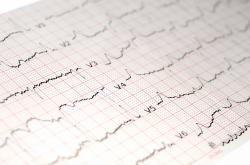
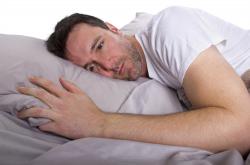


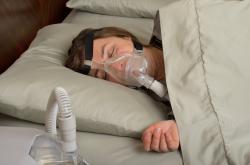
.jpg)
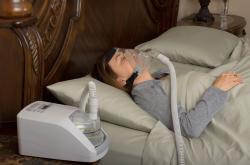

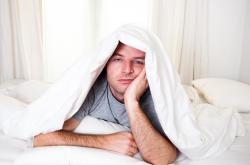







Leave a comment